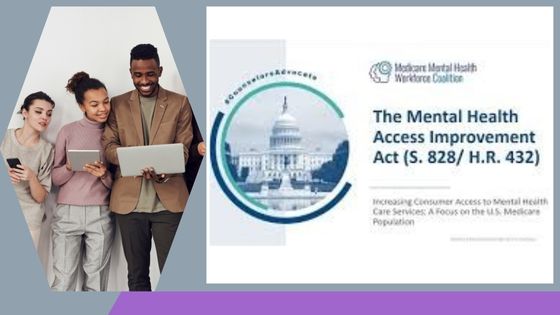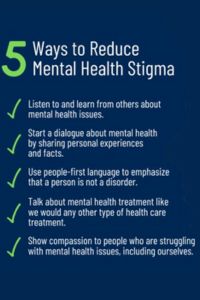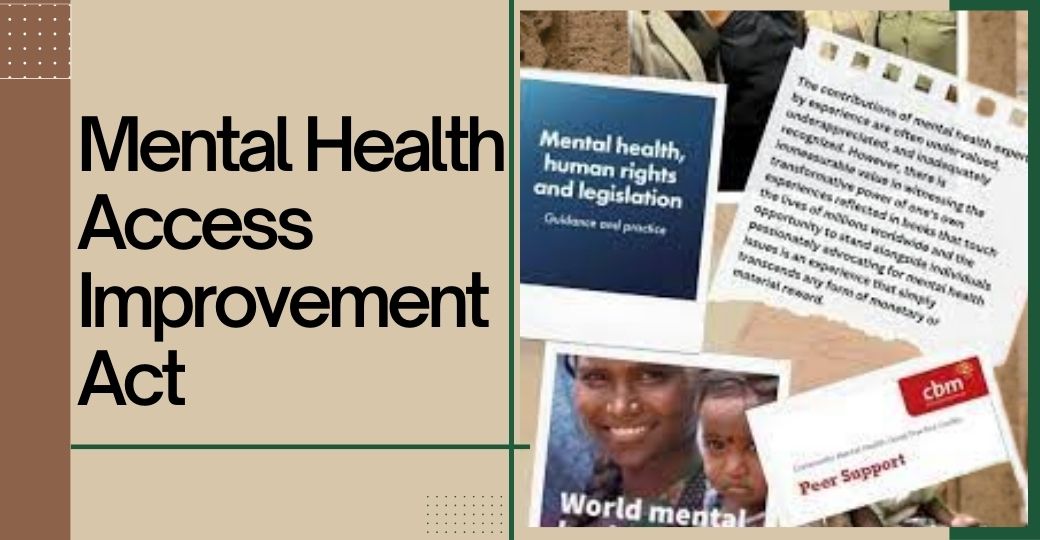The mental health access improvement act passed aims to enhance accessibility and quality of mental health care. This legislation will address barriers preventing individuals from receiving necessary mental health support by expanding access to services and improving insurance coverage.
Mental health is a pressing issue that affects millions of individuals globally. However, many people face significant hurdles when attempting to access the mental health care they need. The mental health access improvement act is a legislative proposal that seeks to address these challenges and improve the availability and quality of mental health services.
By breaking down barriers and expanding access to care, this act aims to ensure that individuals can receive timely and effective treatment for their mental health needs. Additionally, this legislation also aims to enhance insurance coverage for mental health services, ensuring that individuals can afford the necessary treatments. We will explore the potential impact of the mental health access improvement act passed and its significance in improving mental health outcomes.
Understanding Mental Health Access
Mental health access is a crucial aspect of overall well-being, yet it remains a significant challenge for many individuals and communities. The mental health access improvement act aims to address these issues and ensure that everyone has equitable access to the care they need.
In this section, we will explore the current state of mental health access, the barriers individuals face, and the impact of limited access on both individuals and communities.
Current State Of Mental Health Access
- Limited availability of mental health professionals: The current state of mental health access is characterized by a shortage of qualified professionals. There simply aren’t enough psychiatrists, psychologists, and therapists to meet the growing demand for mental health services.
- Unequal distribution of resources: Mental health services are not evenly distributed, which leads to significant disparities in access. Rural areas, in particular, tend to have fewer mental health providers, making it challenging for individuals in these regions to access mental health care.
- Insurance barriers: Insurance coverage for mental health services is often limited, making it difficult for individuals to afford the treatment they need. Many insurance plans have higher copays, stricter limitations, or even exclude mental health coverage altogether.
- Stigma and cultural barriers: The stigma surrounding mental health issues continues to be a significant barrier to access. Many individuals fear discrimination or judgment if they seek help for their mental health concerns. Cultural beliefs and lack of awareness may also prevent individuals from seeking care.
Barriers To Mental Health Services
- Lack of awareness and education: Limited knowledge about mental health issues and available resources can be a significant barrier. Some individuals may not even recognize their symptoms as mental health concerns, while others may simply not know where to go for help.
- Long wait times: The demand for mental health services often overwhelms the available resources, resulting in long wait times for appointments. This delay can be detrimental, as individuals may deteriorate further while waiting for treatment.
- Affordability: For many individuals, the cost of mental health services is prohibitive. High costs and inadequate insurance coverage can prevent individuals from seeking care, leading to untreated mental health conditions.
- Systemic barriers: Structural barriers, such as discriminatory practices, limited mental health services in certain areas, and language barriers, can significantly impact access to care. These systemic barriers disproportionately affect marginalized communities.
Impact Of Limited Access On Individuals And Communities
- Increased psychological distress: Limited access to mental health services can lead to increased psychological distress among individuals. Without timely and appropriate treatment, symptoms of mental illnesses may worsen, affecting an individual’s quality of life.
- Negative impact on physical health: Mental health and physical health are closely interconnected. Limited access to mental health care can result in individuals neglecting their overall well-being, leading to negative consequences for their physical health.
- Productivity and economic implications: Untreated mental health conditions can impact an individual’s productivity and contribute to absenteeism or decreased work performance. This can have economic implications on both the individual and the wider community.
- Strain on support systems: Without access to adequate mental health services, individuals may rely even more heavily on their support systems, including family, friends, and communities. This increased strain can have ripple effects on the well-being and overall functioning of these systems.
Understanding the current state of mental health access, the barriers individuals face, and the impact of limited access is crucial in highlighting the urgent need for improvement. The mental health access improvement act passed aims to address these issues and establish a more equitable and accessible mental health care system for all.

The Mental Health Access Improvement Act: A Comprehensive Solution
Access to quality mental health care is crucial for individuals struggling with mental health conditions. The mental health access improvement act aims to address this pressing issue and provide comprehensive solutions to meet the needs of those seeking mental health services.
Let’s explore the key provisions of this essential act:
Key Provisions Of The Mental Health Access Improvement Act
Increasing availability of mental health professionals:
- The act proposes various measures to enhance the number of mental health professionals available to the public.
- Scholarships and loan forgiveness programs will be established to encourage individuals to pursue careers in mental health professions.
- Grants and funding will be allocated to mental health training programs to facilitate the training and education of professionals.
Integrating mental health services into primary care:
- Recognizing the connection between mental and physical health, the act emphasizes integrating mental health services into primary care settings.
- This provision ensures that individuals can access mental health care seamlessly when visiting their primary care physicians.
- Collaborative care models will be promoted to facilitate coordination between primary care providers and mental health professionals.
Expanding telehealth and digital solutions:
- The act recognizes the potential of telehealth and digital solutions in improving access to mental health care, particularly in underserved areas.
- Telehealth services will be expanded to allow individuals to receive mental health services remotely, ensuring access to care regardless of location.
- Digital solutions, such as mobile applications and online therapy platforms, will be encouraged and regulated to provide additional avenues for mental health support.
The mental health access improvement act passed a comprehensive solution to address the barriers individuals face when seeking mental health care. By increasing the availability of professionals, integrating mental health services into primary care, and expanding telehealth and digital solutions, this act takes significant steps in improving access to vital mental health services for all.
Benefits Of The Mental Health Access Improvement Act
Improving Mental Health Outcomes For All Individuals
- The mental health access improvement act aims to improve mental health outcomes for all individuals by facilitating easier access to quality mental healthcare services.
- One key benefit of this act is that it promotes the integration of mental health services into primary care settings, ensuring that individuals can receive comprehensive and coordinated care for both their physical and mental health needs.
- By improving access to mental health services, individuals can receive timely treatment and support, leading to better outcomes in terms of symptom management, recovery, and overall well-being.
- Additionally, this act encourages the use of evidence-based practices in mental healthcare, ensuring that individuals receive effective and appropriate treatments that have been proven to be beneficial.
- The act also emphasizes the importance of personalized and patient-centered care, recognizing that each individual’s mental health needs may be unique and require tailored interventions.
Reducing Stigma Surrounding Mental Illness

- One of the key goals of the mental health access improvement act is to reduce the stigma associated with mental illness.
- Stigma often acts as a barrier to seeking help and support for mental health issues. By reducing this stigma, more individuals may feel comfortable reaching out for assistance and accessing the care they need.
- This act promotes public education programs and awareness campaigns to increase understanding and empathy towards individuals with mental illness.
- It also encourages the development of anti-stigma initiatives in communities and workplaces, fostering a more inclusive and supportive environment for individuals dealing with mental health challenges.
- By reducing stigma, the act aims to create a society that is more accepting and supportive of individuals with mental illness, enabling them to lead fulfilling lives.
Enhancing Support For Vulnerable Populations
- The mental health access improvement act passed the importance of providing enhanced support for vulnerable populations, including children, adolescents, older adults, and individuals from marginalized communities.
- This act seeks to address disparities in access to mental health care by improving the availability and affordability of services for these populations.
- It calls for increased funding and resources to expand mental health programs specifically tailored to the unique needs of vulnerable populations.
- By enhancing support, the act aims to ensure that all individuals, regardless of age, socio-economic status, or background, can access the mental health care they need to thrive.
- This act also encourages the integration of culturally competent and diverse mental health services, allowing individuals from different backgrounds to receive care that is sensitive to their specific needs and experiences.
Promoting Early Intervention And Prevention
- The mental health access improvement act passed a strong emphasis on promoting early intervention and prevention strategies in the field of mental health.
- By focusing on prevention, the act aims to identify and address mental health issues before they escalate, ultimately reducing the burden on individuals, families, and communities.
- This act supports the implementation of mental health screening programs in various settings such as schools, primary care clinics, and workplaces. Early identification of mental health concerns allows for timely intervention and support.
- By promoting early intervention, the act aims to prevent the progression of mental health issues and the associated negative consequences, such as increased healthcare costs and reduced quality of life.
- Ultimately, this act recognizes the importance of addressing mental health proactively and believes that early intervention and prevention efforts can lead to better outcomes for individuals and society as a whole.
Closing The Treatment Gap: The Role Of Advocacy
Recognizing The Importance Of Mental Health Advocacy
Mental health advocacy plays a vital role in closing the treatment gap and ensuring that individuals have access to the care and support they need. By raising awareness, supporting legislative efforts, and collaborating with organizations and communities, advocates are instrumental in driving change and improving mental health access for all.
Here are some key points to consider:
- Advocacy raises awareness: By speaking out about the importance of mental health, advocates help to reduce the stigma associated with mental illness. By sharing personal stories and experiences, they humanize the issue and help to educate others on the challenges faced by individuals living with mental health conditions.
- Legislative efforts for mental health access: Advocates voice the need for policy changes and improvements in mental health legislation. They support initiatives such as the mental health access improvement act passed, which aims to expand access to mental health services and ensure insurance coverage for mental health care. These legislative efforts are crucial in addressing barriers to treatment and improving affordability and availability of services.
- Collaboration with organizations and communities: Advocacy is not a solo endeavor. By collaborating with organizations, advocates work together to create meaningful change. They form partnerships with mental health service providers, community leaders, and other stakeholders to develop innovative solutions, promote awareness campaigns, and increase access to mental health resources.
Supporting Legislative Efforts For Mental Health Access
Legislation plays a crucial role in shaping mental health access and improving the quality of care available to individuals. Advocacy efforts that support legislative changes are essential to bridge the treatment gap. Here are some key points to consider:
- Expanding insurance coverage: Advocacy efforts focus on ensuring comprehensive insurance coverage for mental health services. By advocating for mental health parity, advocates strive to eliminate discrimination between mental health and physical health care, ensuring equal and fair access for individuals seeking treatment.
- Breaking down barriers to treatment: Advocates work towards removing barriers that prevent individuals from accessing mental health care. This includes advocating for increased funding for mental health services, addressing workforce shortages, and expanding telehealth options to reach underserved communities.
- Addressing systemic issues: Advocacy efforts go beyond individual access and address systemic issues within the mental health care system. Advocates push for changes that address social determinants of mental health, such as poverty, homelessness, and discrimination. They advocate for comprehensive approaches that promote mental wellness and prevention, focusing on early intervention and support.
Collaborating With Organizations And Communities
Collaboration is key in the fight to improve mental health access. By working together, advocates, organizations, and communities can create a powerful force for change. Here are some key points to consider:
- Partnering with mental health service providers: Advocates collaborate with mental health care providers, including clinics, hospitals, and counseling centers. By partnering with these professionals, advocates can gain valuable insights into the challenges faced by providers and work together to develop effective solutions.
- Engaging community leaders: Advocates engage with community leaders to promote mental health awareness and create supportive environments. They collaborate with local governments, schools, workplaces, and other community organizations to implement mental health programs and initiatives that meet the unique needs of each community.
- Amplifying lived experiences: Advocates foster a sense of community by amplifying lived experiences of individuals affected by mental health challenges. By sharing personal stories, advocates humanize mental health issues and help others realize that they are not alone. These stories also serve as powerful tools for shaping policies and dispelling stereotypes.
Mental health advocacy plays a vital role in closing the treatment gap and improving access to care. By raising awareness, supporting legislative efforts, and collaborating with organizations and communities, advocates are catalysts for change. Their tireless efforts bring us closer to a future where everyone has the opportunity to receive the mental health support they need.
Mental Health Improvement Act
The Mental Health Improvement Act is a legislative initiative to enhance mental health services and support systems. It seeks to increase access to mental health care, improve the quality of treatment, and integrate mental health services into broader health care frameworks. The Act typically includes:
- Provisions for expanding mental health programs.
- Increasing funding for mental health services.
- Promoting mental health awareness.
- Ensuring better coordination among healthcare providers.

Its goal is to address the growing need for mental health resources and, importantly, to lead the charge in reducing the stigma associated with mental health issues. The mental health improvement act aspires to create a society where mental well-being is prioritized, and everyone can lead a healthy, fulfilling life by strengthening mental health services.
Frequently Asked Questions On Mental Health Access Improvement Act Passed
What Is The Mental Health Access Improvement Act?
The mental health access improvement act is a legislative proposal aimed at enhancing mental health resources and reducing barriers to mental healthcare access for individuals.
How Will The Mental Health Access Improvement Act Benefit Individuals?
The mental health access improvement act will improve individuals’ access to mental healthcare services by expanding the types of providers eligible for medicare reimbursement and ensuring mental health services are covered by insurance plans.
What Providers Are Included Under The Mental Health Access Improvement Act?
The mental health access improvement act includes providers such as psychologists, clinical social workers, and licensed professional counselors, expanding the pool of professionals eligible for medicare reimbursement for mental healthcare services they provide.
Will The Mental Health Access Improvement Act Impact Insurance Coverage For Mental Health Services?
Yes, the mental health access improvement act will improve insurance coverage for mental health services by mandating that insurance plans cover mental health services at the same level as other medical services.
How Will The Mental Health Access Improvement Act Be Funded?
The mental health access improvement act will be funded through a combination of public and private sources, including federal funding allocations, grant programs, and contributions from healthcare organizations. Its goal is to increase access to mental healthcare services for all individuals.
Conclusion
Access to mental health services is a fundamental right that should be accessible to all individuals. The mental health access improvement act aims to address the barriers and challenges that many people face in obtaining mental health support. By expanding insurance coverage, increasing the number of mental health professionals, and promoting telehealth services, this legislation seeks to make high-quality mental health care more readily available to those in need.
With improved access to mental health services, individuals will have greater opportunities for early intervention, prevention, and treatment, ultimately leading to better overall well-being and a healthier society. It is crucial for communities, policymakers, and healthcare providers to work together to ensure that everyone has equal access to the mental health care they require.
The mental health access improvement act passed represents an important step towards achieving this goal and creating a more inclusive and supportive environment for those struggling with mental health challenges.

I am an SEO expert, Digital Marketing-specialized writer, and blogger based in the USA & UK. I have four years of experience in SEO, Digital Marketing, Social Media, and Technology. So, I work on solving these issues and give various tips on these issues

